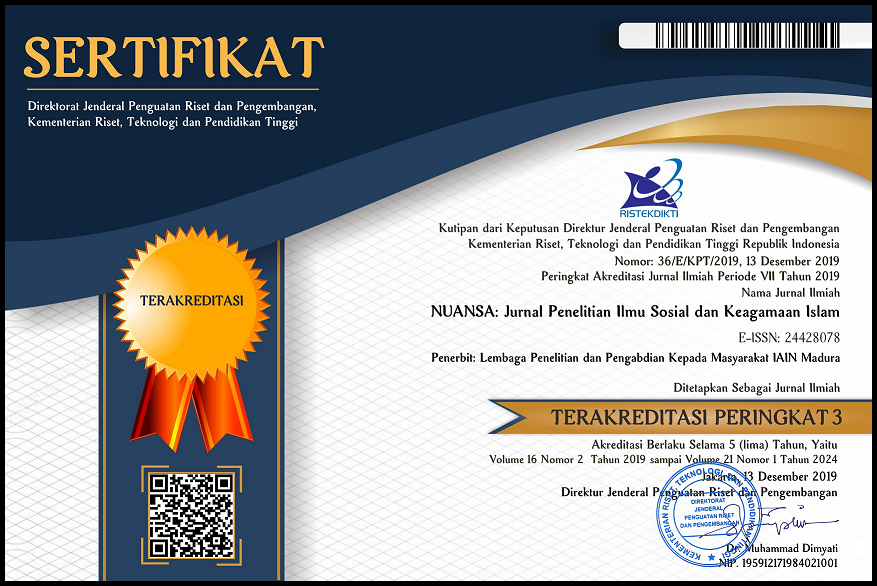NAHDLATUL ULAMA (NU) SEBAGAI CIVIL SOCIETY DI INDONESIA
 Abstract views: 2016
,
Abstract views: 2016
,
 PDF downloads: 2293
PDF downloads: 2293
Abstract
Downloads
References
Culla, Adi Suryadi. Masyarakat Madani; Pemikiran,Teori, dan Relevansinya dengan Cita-Cita Reformasi. Jakarta: Raja Grafindo Persada. 1999
Culla, Adi Suryadi. Rekonstruksi Civil Society: Wacana dan Aksi Ornop di Indonesia, Jakarta: LP3ES. 2006
Feith, Herbert. dan Lance Castles (ed). Pemikiran Politik Indonesia 1945-1965, Jakarta: LP3ES. 1988
Huntington, Samuel P. Gelombang Deokratisasi Ketiga., Jakarta: Pustaka Utama Grafiti. 2001
Kurniawan, Lutfi J. dkk. Negara, Civil society dan Demokratisasi: Pergerakan Membangun Solidaritas Sosial dalam Merebut Perubahan. Malang: In-TRANS Publishing. 2008
Sjadzali, H. Munawir. Islam dan Tata Negara. Ajaran, Sejarah dan Pemikiran. Jakarta: UI Press. 1980
-----------------------------------------------------
Ahmad Fathan Aniq, “Menimbang Civil Society dan Masyarakat Madani; Antara Mitos dan Realitas.” http:// fathananiq.wordpress.com/ 2008 /03/09/ menimbang-civil-society-dan-masyarakat-madani-antara-mitos-dan-realitas/
Tjahyo Rawinarno, “Civil Society di Indonesia Studi Kasus Nahdlatul Ulama.” http://newblueprint.wordpress.com/2008/05/18/civil-society-di-indonesia-studi-kasus-nahdlatul-ulama/
The journal operates an Open Access policy under a Creative Commons Attribution-NonCommercial 4.0 International License (CC-BY-NC) 
Authors who publish with this journal agree to the following terms:
- Authors retain copyright and grant the journal right of first publication with the work simultaneously licensed under a Creative Commons Attribution License that allows others to share the work with an acknowledgement of the work's authorship and initial publication in this journal.
- Authors are able to enter into separate, additional contractual arrangements for the non-exclusive distribution of the journal's published version of the work (e.g., post it to an institutional repository or publish it in a book), with an acknowledgement of its initial publication in this journal.
- Authors are permitted and encouraged to post their work online (e.g., in institutional repositories or on their website) prior to and during the submission process, as it can lead to productive exchanges, as well as earlier and greater citation of published work.






















